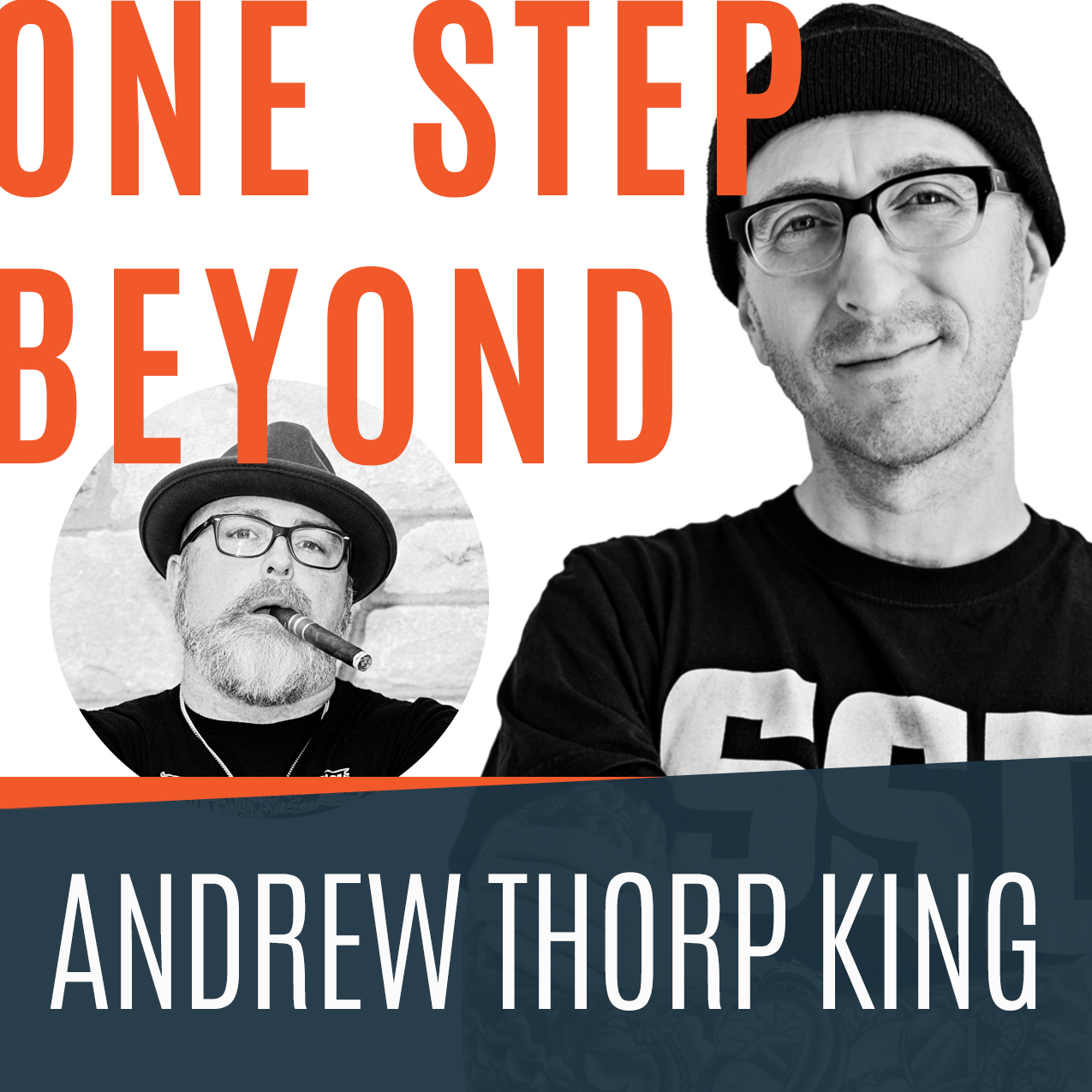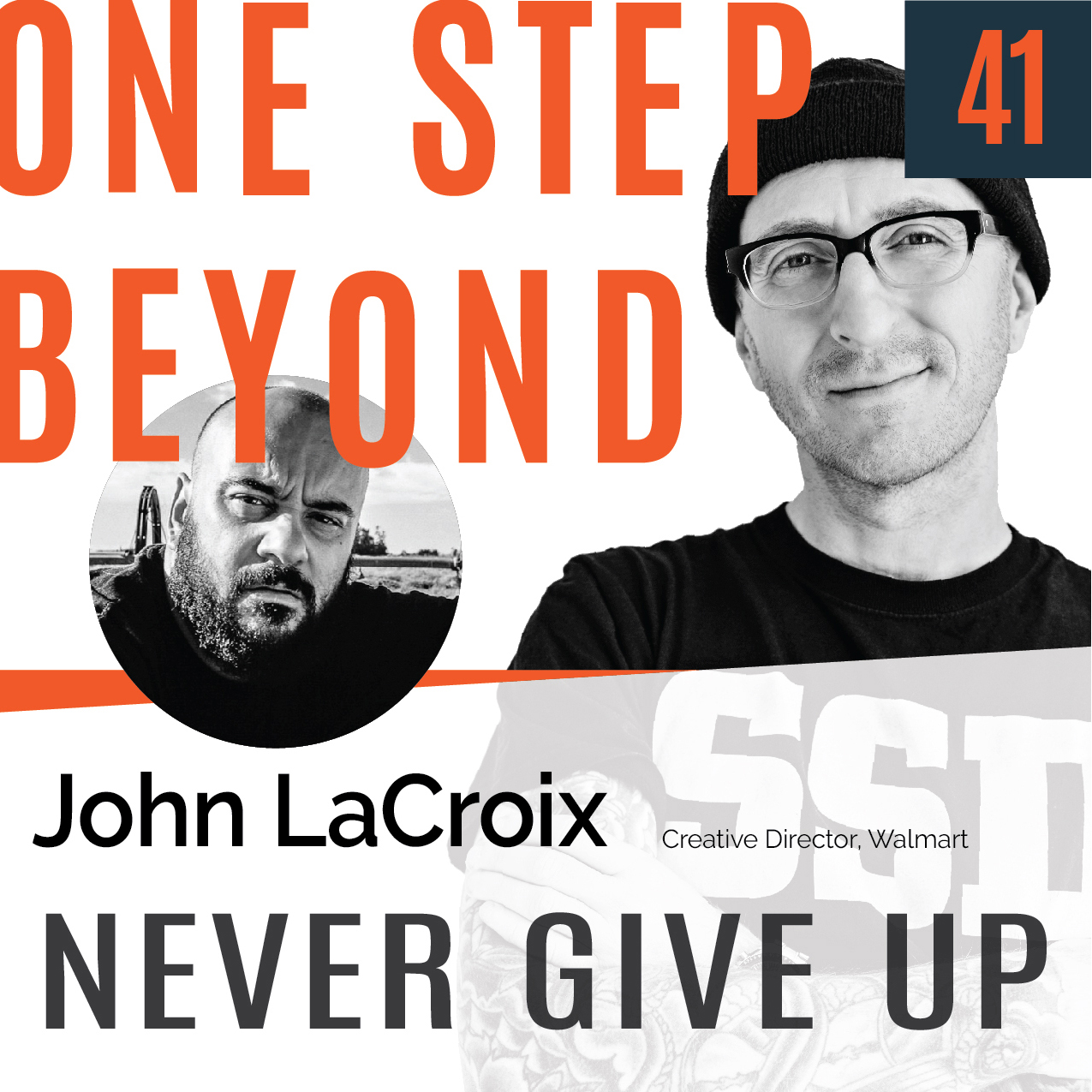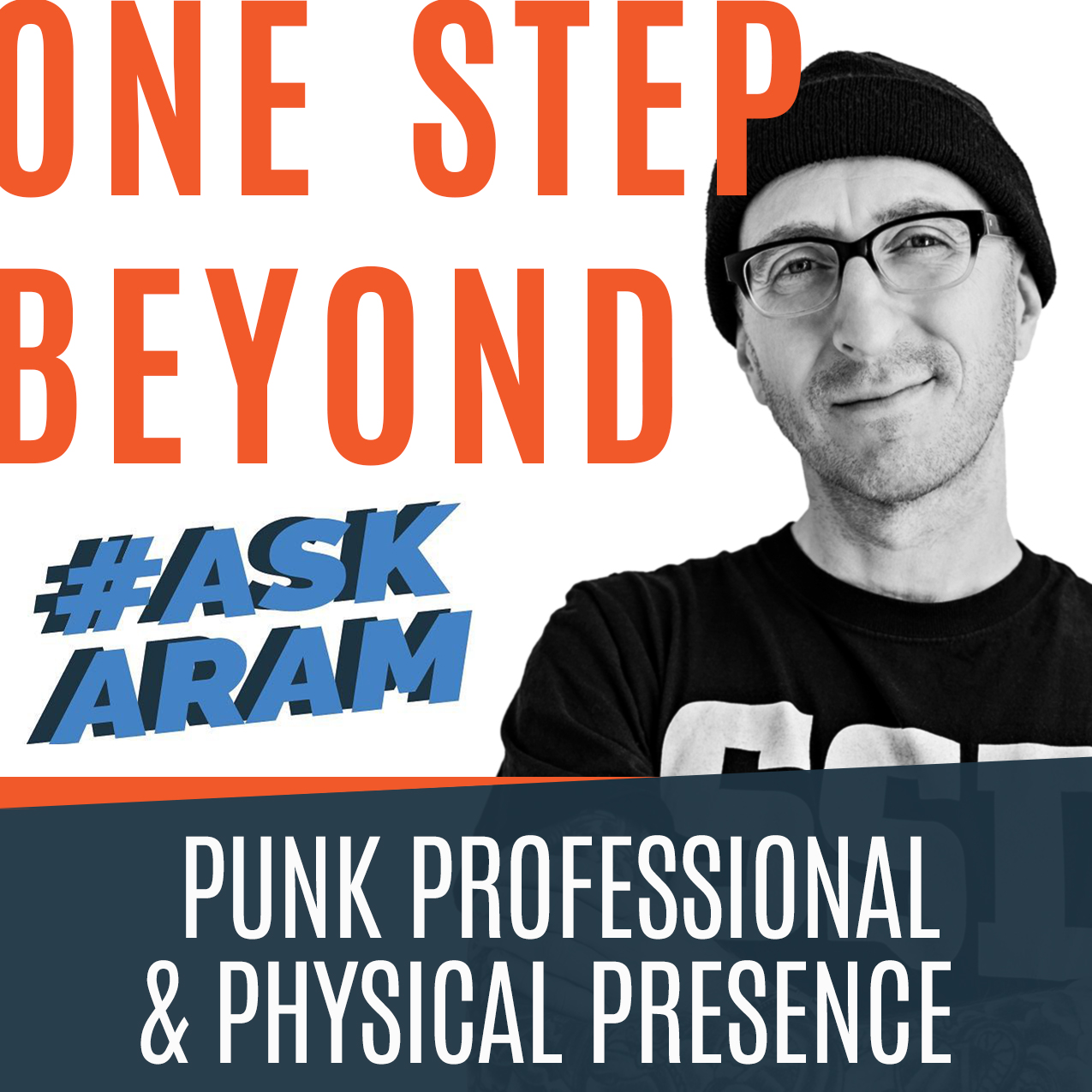Episode Transcript
00:00:01:22 - 00:00:26:16
One Step Beyond:
Hey everyone, welcome to the episode. So ask around flips the script one step beyond podcast guests and listeners submit their questions and ask Aram anything. Questions can be music, life stories, business leadership advice, how to make the best vegan omelet, You name it around, unpack your questions and leave you with info you can apply before we get to it.
00:00:26:19 - 00:00:29:17
One Step Beyond:
Please rate review and subscribe.
00:00:29:19 - 00:00:56:20
Keri Fraser:
Hi Aram. Okay, so here's my question for you regarding burnout. Nowadays, so many people are experiencing burnout. It almost seems to be they realize that once it's so far into exhaustion already. How can people identify burnout at their really early stages? Like, what are those first signs and what can they do about it before it gets into those stages of exhaustion?
00:00:57:00 - 00:00:58:00
Keri Fraser:
Thanks around.
00:00:58:01 - 00:01:20:19
Aram Arslanian:
Amazing question. Thanks, Keri. The way that you can avoid finding out too late about burnout is to focus on handling it when you're in the first stage, which is mild burnout within that, really protecting your four pillars of health. So let me unpack it. Just like most things. Burnout exists on a spectrum and there's mild burnout. There's moderate burnout and there's severe burnout.
00:01:20:19 - 00:01:37:07
Aram Arslanian:
And before I get into that, just to kind of demystify the idea of burnout, it's a big topic now. And it should be, especially because of what we've been going through around the pandemic and just the intensity of life in the past few years. Burnout, though, is like a really relatively normal human experience. You get burnt out on all sorts of things.
00:01:37:08 - 00:01:50:08
Aram Arslanian:
I mean, I binge watched the first season of Love Is Blind when it came out, and I never wanted to watch TV again. I was like, Yeah, take it. You get burnt out in restaurants, you can get burnt out on friendships. Think of like your most difficult friend. And sometimes you're like, I've just had enough of that person.
00:01:50:09 - 00:02:05:22
Aram Arslanian:
You still love them, but you're a little bit burnt out. Burnout is normal. It's just your psychology telling you like tapping on the shoulder and saying, Hey, you need a break from this burnout in and of itself. As I said, it's like a normal human experience because it operates on a spectrum. When you're having a little bit of burnout, you just take a little bit of a break.
00:02:05:22 - 00:02:28:00
Aram Arslanian:
But outside of that, the stakes get higher and higher and higher. So an easy way to understand this is mild burnout. Moderate burnout and severe burnout all operate on what I call the three piece. When you experience mild burnout, your patterns start to go. So the key there is your patterns, and these are your patterns of self-care. When you're experiencing moderate burnout, it's you're performing worse.
00:02:28:00 - 00:02:44:00
Aram Arslanian:
So the way that you operate, both personally and professionally, like show up in your life, that starts to slip. But when you get into severe burnout, which is a relatively rare place for people to get, the key that's affected here is your personality. The person who's showing up to work or in their home life is just not the same person.
00:02:44:04 - 00:02:58:20
Aram Arslanian:
So let's just focus right now on mild burnout. Those warning signs and how to deal with it. So when I say your patterns of self-care, think of a chair. So a chair and ideally here we'll talk about the chair with four legs. Everybody likes a chair. I love a chair. Most people want to take a load off and sit down.
00:02:58:20 - 00:03:19:12
Aram Arslanian:
A chair with four legs allows you to properly relax and then when you're ready, you get up and keep walking or doing whatever you want to do. That's the same thing with your pillars of self-care. Do you have strong pillars of self-care when you start getting burnt out, when you start getting tired, when you're having a harder time, you essentially can lean back into them and they're going to hold up your weight when done right.
00:03:19:12 - 00:03:37:03
Aram Arslanian:
So the pillars of self-care are going to be exercise, diet, sleep and social. When I say exercise, I don't mean like you're out there trying to get, like, totally ripped. I just mean having the proper amount of exercise that you should have. I'm not talking about some super wild workout. Whatever works for you, but it should be minimum three times a week.
00:03:37:03 - 00:03:57:13
Aram Arslanian:
And of those times 30 minutes, it can be longer than that and can be more often than that. That's just a baseline minimum to maintain a pillar, an excellent diet. I'm not talking about going on a diet. I'm not talking about anything around weight loss. I simply mean, do you have the amount of food in your house or at work to maintain the right amount of calorie intake so that you're energized?
00:03:57:13 - 00:04:18:18
Aram Arslanian:
And is that food nutritious? I know nutritious food can be a bit of a difficult conversation. What would be considered nutritious food like? Is there a lesser food that's a bigger conversation that I can get into here. But simply to say having a balanced diet that gives you the amount of carbs, fats, nutrients that you need to show up, that's important and doesn't mean that you can't eat like candy.
00:04:18:22 - 00:04:36:07
Aram Arslanian:
While that's food, of course you can. But it's about do you have the right combination of things to keep you going? The third is sleep. Classically, when people get stressed out and overworked, sleep starts getting compromised. So are you having the right amount of sleep per night? And then finally, social. All human beings are social animals and you might be like, not for me.
00:04:36:07 - 00:04:57:00
Aram Arslanian:
I don't like people. I like being alone. I totally get that. But even the most introverted people have some need for social time, some level of social connection so that they are a part of greater society. I won't say that for everyone, but most people. So if you think about these legs and I refer to it as the legs of a chair, these are the things that hold you up when you start getting stressed out.
00:04:57:00 - 00:05:16:07
Aram Arslanian:
But for most people they have a leg that is easily taken out when they get stressed. So if I'm overworked or I've got a lot of stuff going on, the leg that goes out for me is exercise. So it's like I've got like a series of totally wild meetings. I've got a lot going on. Maybe I've got some challenges in my personal life or the business or both.
00:05:16:07 - 00:05:34:15
Aram Arslanian:
I suddenly make up an excuse to not exercise, or it doesn't happen for a variety of reasons. Now I have a chair that has three legs. You can still sit in a chair with three legs and have a fairly relaxing experience. You know, you kind of have to balance your weight a little bit, maybe use one of your legs to keep you from toppling over, but you can still pretty much relax into a chair that has three legs.
00:05:34:15 - 00:05:54:15
Aram Arslanian:
But the challenge is most people, as I said, have one leg that's kind of easily taken out, but you usually have another leg of your chair that goes as a chain reaction to the first one going. So for me, it's always diet. As soon as I stop exercising, it's like this mental switch has been flipped towards like, Oh, you just gave yourself an excuse to eat all of the candy, donuts, fried food.
00:05:54:15 - 00:06:10:23
Aram Arslanian:
And I will turn into like Cookie Monster. I'm just like, Oh, and I will start eating the highest amounts of the worst food while reducing the amount of really good food. Or I'll just stop eating because I'll just like, drink tons of coffee and just do like hyperfocus on work in both cases. Now I've lost two legs of the chair.
00:06:10:23 - 00:06:30:08
Aram Arslanian:
Can you sit in a chair that has two legs? Of course. But at that point you're using your two legs to balance out the chair. The benefits of sitting down are far decreased because you're using your legs, you're using your core to kind of stabilize yourself. At that point, if one of the other legs goes out, then you've got a chair that has three legs and there's literally no point in trying to sit in a chair with three legs.
00:06:30:08 - 00:06:44:15
Aram Arslanian:
Like the effort to sit in that chair far supersedes any of the benefits that come from that. So the reason I'm talking about this is, you know, you're getting burnt out when your patterns of self-care start to go. So whatever your established patterns are, if they start to slip, it is a warning sign that you're getting burnt out.
00:06:44:17 - 00:07:01:04
Aram Arslanian:
Most professionals get mildly burnt out between 2 to 4 times a year. So for a lot of people it happens within quarters. When you're trying to deliver results for a quarter, it's super normal. But the goal here is catching it quickly. If you eat poorly for like a week, does that mean that you've lost the diet side? No, not at all.
00:07:01:04 - 00:07:18:17
Aram Arslanian:
But if it's persisting for more than two weeks and you're eating like quite a bit different than you usually would, that's a sign. But if one of your other legs goes out, gets compromised, then you're definitely in a mild burnout space. You're not completely, mildly burned out, but you're compromised. So your patterns of self-care are starting to get compromised.
00:07:18:17 - 00:07:33:19
Aram Arslanian:
And if you play that out long enough, all the legs are going to be gone and you're not going to be kicking any weight off. You are going to be standing. Human beings can only stand for so long. And when you can't stand anymore, that's when you go into the next phase of burnout, which is moderate burnout and a moderate burnout.
00:07:33:19 - 00:07:52:12
Aram Arslanian:
Remember, the key there that gets impacted is performance. So you can't sit in the chair anymore. That's been impacted. You're tired, you're not your best self, so your performance starts getting impacted. Now, you know, the warning signs, your patterns of self-care are getting impacted. Again, it's exercise, diet, sleep and social. But how do you manage it if you find yourself in a mild burnout?
00:07:52:12 - 00:08:09:14
Aram Arslanian:
There's two things you need to do. I deeply encourage you do them right away. The first is you have to reinstate your patterns of self-care. It's the most important and it sucks. There's nothing worse than being like I have to exercise or I have to get back on how I properly eat, or I have to reach out to a friend and hang out, or I have to focus on my sleep when I'm mildly burnt out.
00:08:09:14 - 00:08:28:19
Aram Arslanian:
It just feels like one extra thing. But if you don't do it, the other legs of the chair are going to get compromised almost certainly if your stress is ongoing or rising. So the first thing you have to do is reinstate your patterns of self care. That means that you have to know what your patterns of self-care are and then rinses you immediately partner up with someone.
00:08:28:19 - 00:08:46:17
Aram Arslanian:
It could be a friend. It could be your your partner, it could be your family, could be people at work. But get those going right away. The second thing is you have to take some time off. Classically, what people do around mild burnout is they wait for some vacation that's in the far distance. You know, it's like I'm going to like Maui for two weeks.
00:08:46:17 - 00:09:03:14
Aram Arslanian:
And I always laugh because I'm like, Oh, when are you doing that? They're like, oh, like three months from now. Like, that's terrible. It's too far off to week vacations or week long vacations don't do much for people because the amount of time it takes to like gear up to that and get all your work done gets you so stressed out that the amount of time that you have for downtime isn't enough.
00:09:03:14 - 00:09:26:03
Aram Arslanian:
So what I suggest people do is what I call cluster vacations. If you find yourself getting burnt out, typically if you reinstate your patterns of self-care and take one four day weekend and on that four day weekend, you only allow yourself to work for one hour. It could be an hour. The morning could be an hour at night or half an hour in the morning, half an hour at night, and the rest of your time, your phone is off and put away.
00:09:26:03 - 00:09:46:05
Aram Arslanian:
If you can do that for four days straight and you reinstate your patterns of self-care, your state of mild burnout will be taken care of. If maybe you've gotten to the place where you're almost at moderate burnout or you've just crossed the line, then just do a cluster vacation. So what I mean by that is over the course of three months, take two four day weekends, the way I just describe it and then take three, three day weekends.
00:09:46:06 - 00:10:05:22
Aram Arslanian:
Cluster vacations are much more effective in being able to actually get solid downtime and also not be stressed about like missing work or ongoing projects. The thing about taking cluster vacations is you actually have to book them into your calendar and they're non-negotiable. You have to do it. And I encourage people, it's like you're right at that edge between mild and moderate burnout.
00:10:05:22 - 00:10:22:14
Aram Arslanian:
You should make the two four day weekends basically bouncing off of each other, have one four day weekend, have three days of work, another four day weekend, and then maybe two weeks after that, have a three day weekend and maybe another two weeks later have a three day weekend like spaced them out, but do a big burst at first and do that over three months.
00:10:22:15 - 00:10:42:22
Aram Arslanian:
Reinstating your patterns of self-care is crucial so that you always have that chair that you can sit in because the sitting in the chair allows you to take that weight off. There's a lot of other elements in there, emotional labor, all sorts of things that I could get into around sleep and social. But I simply say patterns of self-care are so critical to backing away from burnout, but also so burnout doesn't get worse.
00:10:42:22 - 00:10:59:06
Aram Arslanian:
Taking effective vacation time, it is so crucial. Don't fear burnout, but engage with it and do the things that are going to keep you healthy and also pull back from that edge. So, Keri, thanks so much for the question and I hope that was helpful for everyone, anyone who's interested in this, we have lots of material about this stuff.
00:10:59:06 - 00:11:04:15
Aram Arslanian:
Just feel free to email me and I'll happily send it over to you.
00:11:04:17 - 00:11:12:10
OSB:
We want to hear from you, our audience. To submit your questions, send us a message. Drop us a DM or comment on our social channels.


